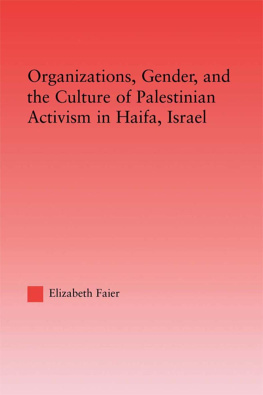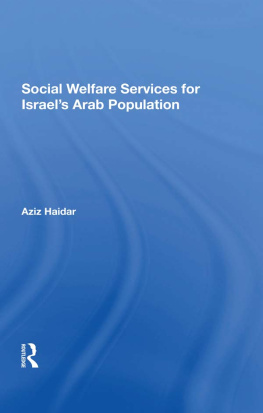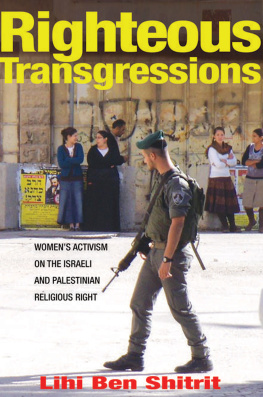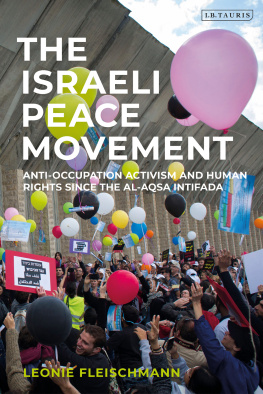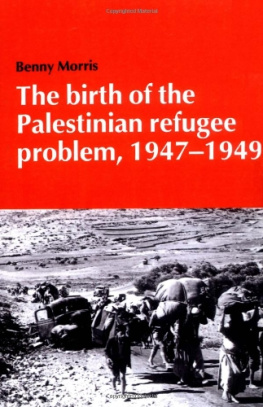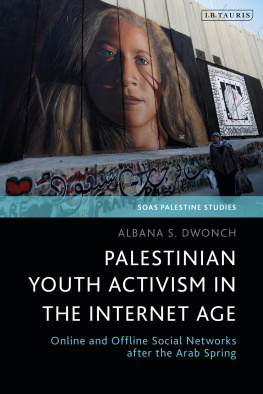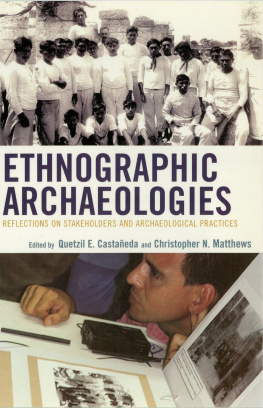ISRAELIPALESTINIAN ACTIVISM
The Mobilization Series on Social Movements, Protest, and Culture
Series Editor
Professor Hank Johnston
San Diego State University, USA
Published in conjunction with Mobilization: An International Quarterly, the premier research journal in the field, this series disseminates high quality new research and scholarship in the fields of social movements, protest, and contentious politics. The series is interdisciplinary in focus and publishes monographs and collections of essays by new and established scholars.
Other titles in this series
From Silence to Protest
International Perspectives on Weakly Resourced Groups
Edited by Didier Chabanet and Frdric Royall
The Fight for Ethical Fashion
The Origins and Interactions of the Clean Clothes Campaign
Philip Balsiger
Understanding the Tea Party Movement
Edited by Nella Van Dyke and David S. Meyer
Dynamics of Political Violence
A Process-Oriented Perspective on Radicalization and the
Escalation of Political Conflict
Edited by Lorenzo Bosi, Chares Demetriou and Stefan Malthaner
Beyond NGO-ization
The Development of Social Movements in Central and Eastern Europe
Edited by Kerstin Jacobsson and Steven Saxonberg
Violent Protest, Contentious Politics, and the Neoliberal State
Edited by Seraphim Seferiades and Hank Johnston
Student Activism and Curricular Change in Higher Education
Mikaila Mariel Lemonik Arthur
IsraeliPalestinian Activism
Shifting Paradigms
ALEXANDER KOENSLER
Queens University Belfast, UK
First published 2015 by Ashgate Publishing
Published 2016 by Routledge
2 Park Square, Milton Park, Abingdon, Oxon OX14 4RN
711 Third Avenue, New York, NY 10017, USA
Routledge is an imprint of the Taylor & Francis Group, an informa business
Copyright Alexander Koensler 2015
Alexander Koensler has asserted his right under the Copyright, Designs and Patents Act, 1988, to be identified as the author of this work.
All rights reserved. No part of this book may be reprinted or reproduced or utilised in any form or by any electronic, mechanical, or other means, now known or hereafter invented, including photocopying and recording, or in any information storage or retrieval system, without permission in writing from the publishers.
Notice:
Product or corporate names may be trademarks or registered trademarks, and are used only for identification and explanation without intent to infringe.
British Library Cataloguing in Publication Data
A catalogue record for this book is available from the British Library
The Library of Congress has cataloged the printed edition as follows:
Koensler, Alexander.
Israeli-Palestinian activism : shifting paradigms / by Alexander Koensler.
pages cm. (The mobilization series on social movements, protest, and culture)
Includes bibliographical references and index.
ISBN 978-1-4724-3945-1 (hardback) ISBN 978-1-3155-9015-8 (ebook) ISBN 978-1-3171-1187-0 (epub)
1. Palestinian Arabs West Bank Social conditions. 2. Wrecking Political aspects West Bank. 3. Palestinian Arabs Government policy Israel. 4. Land use Government policy Israel. 5. Human rights Israel. 6. Social movements Israel. 7. Social movements West Bank. 8. Group identity Israel 9. Group identity West Bank. I. Title.
DS119.76.K634 2015
956.94054dc23
2014030873
ISBN 9781472439451 (hbk)
ISBN 9781315590158 (ebk-PDF)
ISBN 9781317111870 (ebk-ePUB)
Contents
List of Figures
Acknowledgements
The core part of this book is based on ethnographic fieldwork carried out between 2006 and 2007 thanks to a Fellowship of the Ph.D. Programme in Metodologie della ricerca etno-antropologica (MREA) at the Universities of Siena (coordinating administration), Perugia, and Cagliari (associated universities). In addition, follow-up research has been realised thanks to a Postdoctoral Fellowships from the Dipartimento Uomo & Territorio at University of Perugia (Italy) and the Blaustein Institutes for Desert Research of Ben-Gurion University of the Negev (Israel). I am grateful for the valuable support of many people from both institutions that often went far beyond an institutional relationship.
This study would have been impossible without the hospitality, cooperation and friendship of a number of diverse people, some of them appearing under pseudonyms. During several stages of the fieldwork, I have benefited greatly from friendships with Salim Al-Turi, Atwa Abu Frekh, Manar Saria, Maya Perach and Aya Yassin. However, the personal names of ordinary people who make an appearance in this volume are pseudonyms, as are the names of minor localities.
Throughout the years, Cristina Papa of University of Perugia provided invaluable guidance and assistance for this study, first as my PhD supervisor and later in shared academic initiatives. During my stays at the Blaustein Institutes for Desert Research, Yaakov Garb has been an inspirational postdoc supervisor and, along with Pnina Motzafi-Haller and others, a great friend and host. I wish to thank my colleagues and friends at both institutions, whose ideas and debates resonate in many parts of the book. In the vibrant atmosphere of the Dipartimento Uomo & Territorio at University of Perugia, I have learnt how beautiful and far-reaching intellectual engagement can be. At the unique Sede Boqer Campus at Ben Gurion University, I experienced an amazing warm cosmopolitan spirit beyond borders, even in an often frustrating political context. The thoughtful critiques on earlier versions or parts of this study by Cristina Papa, Massimiliano Minelli, Yaakov Garb, Stefano Boni, Michael M.J. Fischer, Pnina Motzafi-Haller, Christine Leuenberger, Gideon Kressel, Avinoam Meir, Georgeta Stoica and Filippo Zerilli have been very important for the development of this book. Annette, Manfred and Scilla have been patient, inspirational lights over the last few years.
Note on Transliteration
There are no uniform standards for the transliteration of Hebrew and Arabic terms into English. In this book, the names of places or people are transliterated to those most commonly used in reports or newspapers. For other words and specialist terms, I follow the simplified transliteration system used by the International Journal of Middle East Studies (IJMES). Transliterated words have been italicised within the text. Working in a multilingual context, some expressions used in interviews or statements throughout the study may appear unfamiliar or inadequate to native English speakers. However, in order not to alter meaning, I have generally decided to leave the original expression as they appeared in their context.
Introduction
When do words and actions empower? When do they betray? These questions guide the reader through an ethnographic journey of the repercussions of activism. In this book, I explore what happens around campaigns against house demolitions in Southern Israeli Negev desert. I investigate what happens before and after bulldozers demolish buildings on contested lands. I follow loud demonstrations, silent meditation circles, guided tours for political tourists and effervescent solidarity festivals as well as victims, funders and activists, across connections, frictions and contradictions. How do emerging actors create new interpretative categories of the conflict? How is it possible to extend the spaces of what seems feasible within the given context of a violent and oppressive conflict? Under which conditions do the words and actions of activists empower? When do they betray their emancipatory intentions?


